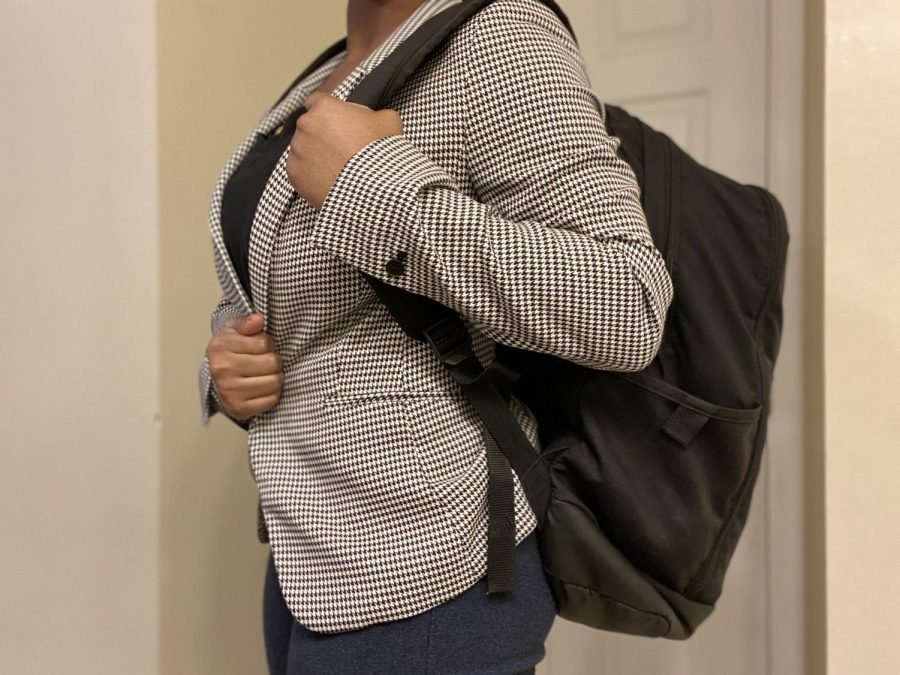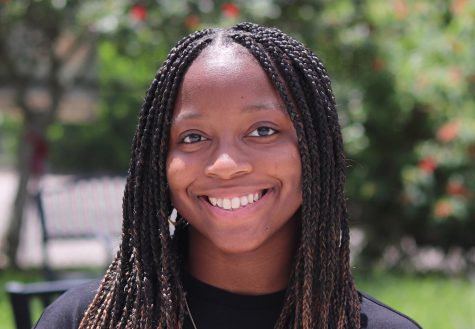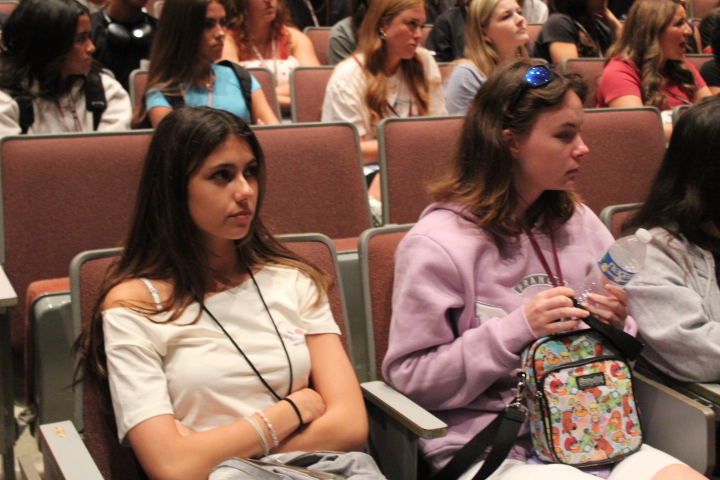Students need education, effort and experience to be successful lawyers
By the book. Confidently adjusting her suit, a student readies herself for a day of classes and extracurriculars, backpack on hand. This transition from her education to her profession as a lawyer marked the critical need for students to actively prepare themselves for their future. Photo by Nya Owusu-Afriyie
April 16, 2021
There is no room for reasonable doubts in advancing one’s legal argument. Similarly, doubt clouds a student’s path to future success when they misunderstand the financial investment, dedication and advantages such as experience and connections needed to be a lawyer.
Practicing law is an opportunity to apply one’s intellect and eloquence to the art of argument. However, actualizing this ambition is an arduous endeavor that continues throughout one’s life, whether it be due to gaining education, licensing or familiarity with professional tasks such as conducting oneself in court.
To become a lawyer, people must first acquire a bachelor’s degree, preferably related to their expected area of practice. They then apply to the law school of their choice, where their Law School Admission Test score, prior academic record, extracurriculars and recommendations are used to assess their potential enrollment.
“An accredited law school is really important, because a degree from a nonaccredited school doesn’t hold as much weight. People are going to question the validity if it’s not from an accredited school,” civil litigation lawyer Georgia Garnecki said.
Earning one’s Juris Doctor Degree at an American Bar Association accredited law school is instrumental to legitimizing their degree. This is exemplified in how Georgia Garnecki’s JD from the accredited Seton Hall University of Law is representative of her educational accomplishments, which demonstrates her credibility to her clients. She is also a partner of the CBR Law Group.
“I attend typically three to four hearings a week on our cases,” Garnecki said. “The past week, I’ve been doing mostly depositions, where if you have a lawsuit and you’re suing another party, you get to ask somebody from the other side questions about the case, and they’re sworn under oath and they have to respond to you.”
After acquiring their JD, graduates must then pass the bar exam for their respective state where they choose to practice law. However, if students belong to states that administer the Universal Bar Exam, they can transfer the validity of their score between other states that have adopted the BME, as it is standardized. In passing their bar exam, students finally receive their license to legally practice law.
“When you graduate from law school, you have no idea how to be a lawyer,” Garnecki said. “I wouldn’t know how to go into a courtroom. I wouldn’t know how to write that first paper. It gives you the skill sets: you do a lot of analyzing cases, a lot of writing about analyzing cases, a lot of legal research, but it doesn’t teach you how to put those skills into practice.”
Graduates then face the obstacle of finding and maintaining a career as a lawyer amid a competitive job market, as well as their lack of experience. While graduates typically become associates at mid-to-large size law firms, Garnecki’s career path deviated due to her legal work for a company during her studies.
“I went to law school at night and worked full-time during the day,” Garnecki said. “My employer loved me so much that they paid for most of my law school, which is highly unusual. When I graduated, I had an opportunity to move into the corporate counsel job, and I did.”
While access to these opportunities may be provided by one’s school, making connections around one’s community is also important to networking and gaining information about possible internship and career openings. These types of programs are crucial to experiencing real-world applications of legal studies.
“This summer, I helped volunteer for a political campaign; during the week of elections, I went out to the library everyday. I was talking to this lady, and her husband’s a judge. He does a lot of tutoring and offers services for women of color to help them with internships and law school, so there are definitely programs out there,” Marjory Stoneman Douglas junior Alyssa Robinson said.
As an aspiring lawyer, Robinson involves herself in local government events in order to familiarize herself with the political system, which is inherently intertwined with the legal system. She focuses on learning about law, formal argument, history and government in order to attain fundamental knowledge necessary for her studies after graduating high school.
“I recommend joining classes and clubs that require you to use rhetoric,” Robinson said. “Law Club and Debate are pretty helpful because they teach you about critical thinking, about analysis. It opens up your mind, because you have to research a bunch of topics. You have to practice argumentation, you have to practice communication skills, you have to be persuasive, and all of those are skills I’ll use.”
Her extracurricular activities and challenging courses, such as Advanced Placement and honors classes, also demonstrate her resourcefulness, academic discipline and foresight to colleges and universities. These qualities are critical for students to hone, as pursuing the practice of law requires an understanding of the work needed to pursue one’s plans for the future.
“Especially in high school, I would recommend figuring out what kind of law you want to practice, so that by the time you get to college and then law school, you already know, so you’re not spending thousands and thousands of dollars and ending up changing your mind,” Robinson said. “It’s not a 100% done deal, but you should still have a general idea.”
As a civil litigation lawyer, Garnecki is adept in a broad number of fields such as family, personal injury, contract dispute, real-estate dispute, trademark, labor and employment law. Keep in mind that regardless of one’s specialization, lawyers typically need to supplement their expertise via education, such as in the various Master of Law degrees with specialization in fields such as election, energy and tax audit law.
“As a lawyer, you’re always required to do continuing education. They want you to stay abreast of the law as it changes; they don’t want you to be not paying attention to what’s going on in the world around you,” Garnecki said.
Similarly, she maintains that staying well-informed about current events and changes in the human landscape is key to legal matters, as seen by her involvement in cases based on prevalent issues such as labor standards during the coronavirus pandemic and unrest regarding the Black Lives Matter movement.
“That’s what fascinates me about it. The fact that it is human judgement. It’s not this static that that you can predict. It’s all up to what people choose to do, how people choose to act,” Robinson said.
Practicing law is satisfying because it is interwoven into society. Although this means that the legal system is often subject to the upturns and downturns of the climate and public opinion surrounding relevant issues such as injustice and unfairness in the judicial branch, it also gives lawyers and aspiring lawyers the opportunity to seek change by directly taking action in this two-way connection between law and society.












